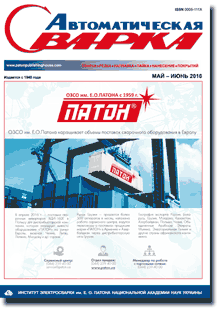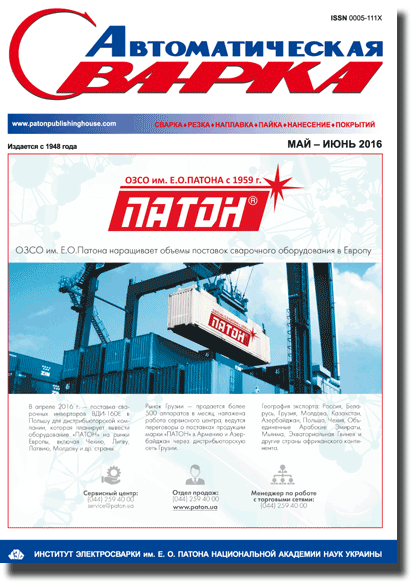| 2016 №06 (17) |
DOI of Article 10.15407/as2016.06.18 |
2016 №06 (19) |

Avtomaticheskaya Svarka (Automatic Welding), #6, 2016, pp. 114-123
Structure and service properties of hybrid laser-arc welded joints of 14KhGN2MDAFB steel
L.I. Markashova, V.D. Poznyakov, E.N. Berdnikova, S.L. Zhdanov, V.D. Shelyagin And T.A. Alekseenko
E.O. Paton Electric Welding Institute, NASU 11 Kazimir Malevich Str., 03680, Kiev, Ukraine. E-mail: office@paton.kiev.ua
Abstract
The paper represents the results of experimental investigations of peculiarities in formation of structure and phase composition of welded joints from high-strength 14KhGN2MDABF steel at different speeds (vw = 72, 90 and 110 m/h) of hybrid laser-arc welding. Information received at different structural levels (from grain to dislocation) is used for analytical evaluation of effect of the structural parameters on mechanical properties and fracture toughness of the welded joints depending on modes of laser-arc welding. The investigations of effect of the structural factors on mode of crack formation under conditions of different dynamic strength tests at external bend loading as well as cyclic loading were carried out for evaluation of a complex of welded joint service characteristics. A role of the structural factors in change of level of local internal stresses, i.e. sources of nucleation and propagation of cracks in the welded joint metal, is shown. The optimum technological modes of hybrid laser-arc welding are determined. They provide for the high indices of mechanical properties and crack resistance of metal under service conditions of external loading from point of view of structure and phase composition. 17 Ref., 2 Tables, 10 Figures.
Keywords: high-strength steel, hybrid laser-arc welding, welded joints, structure, phase composition, mechanical properties, fracture toughness, external loading, crack resistance
Received: 05.04.16
Published: 19.07.16
References
- (1965) High-strength steel: Coll. Ed.by L.K. Gordienko. Moscow: Metallurgiya.
- Houdremont, E. (1959) Special steels. Moscow: Metallurgizdat.
- Paul, K., Ridel, F. (2009) Hybrid laser welding — joining the efforts. Fotonika, 1, 2–5.
- Kah, P., Salminen, A., Martikainen, J. (2010) Laser-arc hybrid welding processes (Review). The Paton Welding J., 6, 32–40.
- Shelyagin, V.D., Khaskin, V.Yu. (2002) Tendencies in development of laser-arc welding (Review). Ibid., 6, 25–28.
- Shorshorov, M.Kh., Belov, V.V. (1972) Phase transformations and properties of steels in welding. Moscow: Nauka.
- Markashova, L.I., Poznyakov, V.D., Berdnikova, E.N. et al. (2013) Specifics of structure of high-strength steel welded joints formed in laser welding conditions. In: of 6th Int. Conf. on Laser Technologies in Welding and of Materials Processing (21–31 May 2013, Katsiveli, Crimea, Ukraine), 51–55.
- Poznyakov, V.D., Shelyagin, V.D., Zhdanov, S.L. et al. (2015) Laser-arc welding of high-strength steels with yield strength of more than 700 MPa. The Paton Welding J., 10, 19–24. https://doi.org/10.15407/tpwj2015.10.03
- Markashova, L.I., Grigorenko, G.M., Poznyakov, V.D. et al. (2009) Influence of thermal cycles of welding and external loading on structural-phase variations and properties of joints of 17Kh2M steel. Ibid., 7, 18–25.
- Markashova, L.I., Poznyakov, V.D., Berdnikova, E.N. et al. (2014) Effect of structural factors on mechanical properties and crack resistance of welded joints of metals, alloys and composite materials. Ibid., 6/7, 22–28. https://doi.org/10.15407/tpwj2014.06.04
- Markashova, L.I., Shelyagin, V.D., Kushnaryova, O.S. et al. (2014) Structural-phase state and mechanical properties of 38KhN3MFA steel surface layers formed under conditions of laser and laser-plasma alloying. In: of 7th Int. Conf. on Mathematical Modelling and Information Technologies in Welding and Related Processes (15–19 Sept. 2014, Odessa, Ukraine), 43–47.
- Conrad, H. (1973) Model of strain hardening for explanation of grain size effect on metal flow stress. In: Super-fine grain in metals, 206–217. Moscow: Metallurgiya.
- Petch, N.J. (1953) The cleavage strength of polycrystals. Iron and Steel Inst., 174(1), 25–28.
- Kelly, A., Nickolson, R.B. (1966) Precipitation hardening. Moscow: Metallurgiya.
- Romaniv, O.N. (1979) Fracture toughness of structural steels. Moscow: Metallurgiya.
- Stroh, A.N. (1954) The formation of cracks as a result of plastic flow. of Roy. Soc. A, 223(1154), 404–415.
- Cottrell, A.H. (1958) Dislocations and plastic flow in crystals. Moscow: Metallurgiya.
The cost of subscription/purchase order journals or individual articles
| Journal/Currency | Annual Set | 1 issue printed |
1 issue |
one article |
| TPWJ/USD | 384 $ | 32 $ | 26 $ | 13 $ |
| TPWJ/EUR | 348 € | 29 € | 24 € | 12 € |
| TPWJ/UAH | 7200 UAH | 600 UAH | 600 UAH | 280 UAH |
| AS/UAH | 1800 UAH | 300 UAH | 300 UAH | 150 UAH |
| AS/USD | 192 $ | 32 $ | 26 $ | 13 $ |
| AS/EUR | 180 € | 30 € | 25 € | 12 € |
| SEM/UAH | 1200 UAH | 300 UAH | 300 UAH | 150 UAH |
| SEM/USD | 128 $ | 32 $ | 26 $ | 13 $ |
| SEM/EUR | 120 € | 30 € | 25 € | 12 € |
| TDNK/UAH | 1200 UAH | 300 UAH | 300 UAH | 150 UAH |
| TDNK/USD | 128 $ | 32 $ | 26 $ | 13 $ |
| TDNK/EUR | 120 € | 30 € | 25 € | 15 € |
AS = «Automatic Welding» - 6 issues per year;
TPWJ = «PATON WELDING JOURNAL» - 12 issues per year;
SEM = «Electrometallurgy Today» - 4 issues per year;
TDNK = «Technical Diagnostics and Non-Destructive Testing» - 4 issues per year.




